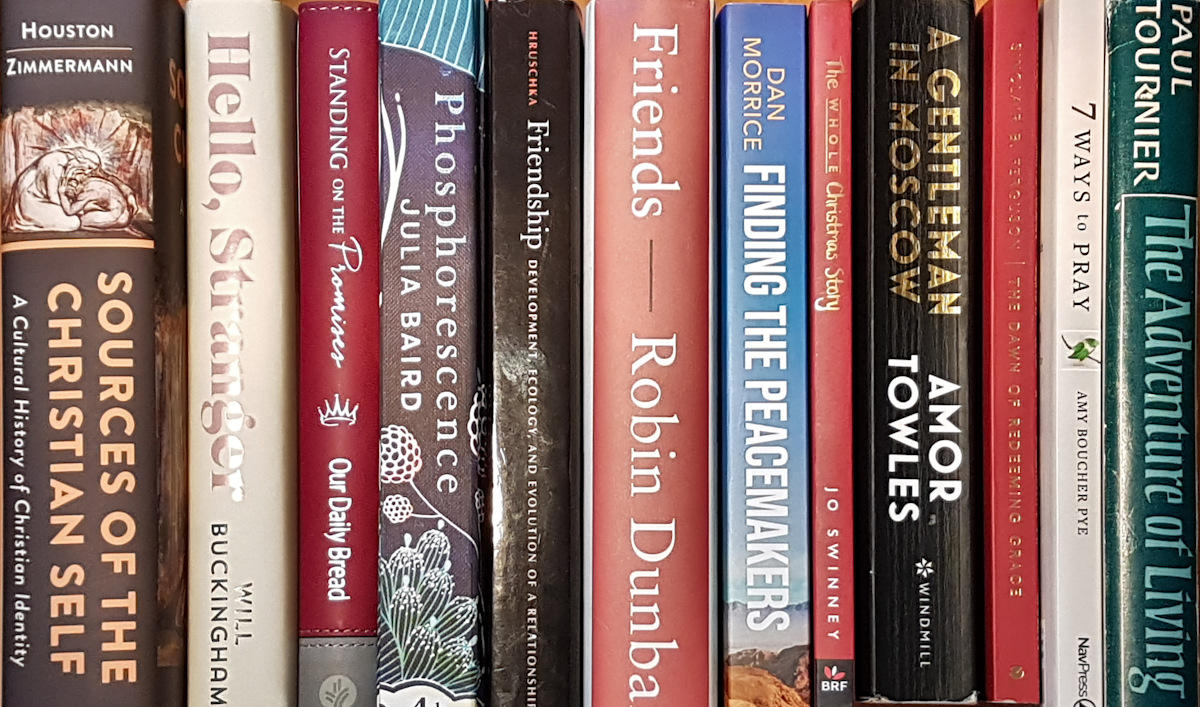
The Best Books I Read in 2021 (and One I Destroyed)
Here it is! The 2021 edition of my annual wrap up of books read, books endorsed, and even books destroyed (now there’s a first). As I note each year, my choice of reading isn’t based on release date, although some listed below are new books for 2021. And for those wondering why I publish this list in November, it turns out people often use it for Christmas gift ideas and publishing in December has previously proven too late.
What was your best read of the year? I’d love to know in the comments. You can find previous year’s lists here. Enjoy!
Particularly Recommended
Hello, Stranger by Will Buckingham
I bought Hello, Stranger expecting it to explore how strangers can become friends. Instead, drawing on anthropology, sociology and personal experience, Buckingham gives us a fascinating deep-dive into what strangers themselves bring into our lives and society. From hospitality codes across cultures to the psychology of crowds, from the nature of neighbours to the way gated communities breed mistrust, it’s a compelling read.
Crossing to Safety by Wallace Stegner
It’s rare for a work of fiction to appear on my Particularly Recommended list, mainly because I read more non-fiction. But this is pure delight. Charting the decades-long relationship of two couples – the Morgans and the Langs – Crossing to Safety is one of the most enjoyable novels I’ve read, with subtle insights into the nature of both individual and couple-to-couple friendship, how bonds are strengthened and tested over time, and how they shape our lives and destinies.
A Gentleman in Moscow by Amor Towles
Another novel I couldn’t wait to return to each evening, Towles’ tale of Count Alexander Rostov, sentenced to house arrest in the Hotel Metropol during Russia’s communist revolution, is an eloquent and evocative story of adaptation, comradery and friendship across age, class and economic difference. The depth of history, philosophical reflection and characterisation, all graced with moments of humour, make the novel worthy of all the accolades it’s received.
Books I Endorsed
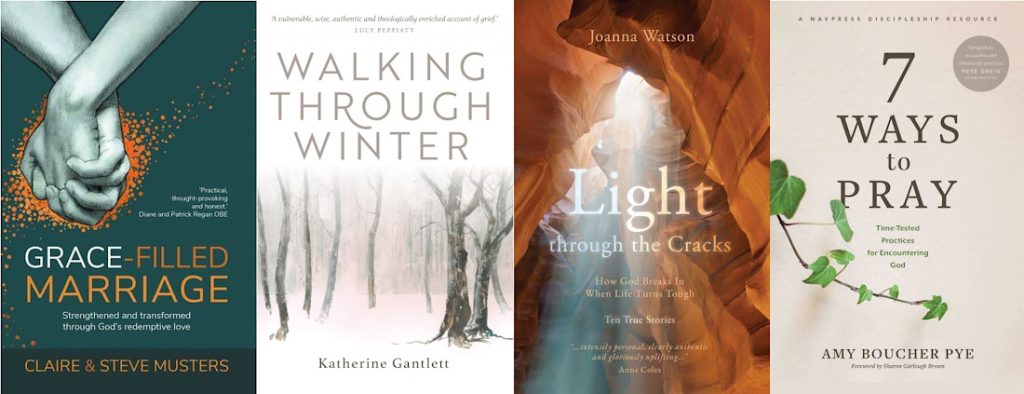
Grace-Filled Marriage by Claire and Steve Musters
“Who would you rather learn from when it comes to marriage: the couple who has sailed though blissfully without challenge, or the one stretched to the limit yet survived? The Grace-Filled Marriage is testament that a marriage can experience disillusionment, disappointment, even infidelity, yet break through to growth and joy. Here are the hard-wrought principles Claire and Steve Musters have learnt along their way.”
Walking Through Winter by Katherine Gantlett
“Multiple miscarriages. A daughter lost in childbirth. Katherine Gantlett knows the blistering chill of life’s winter seasons. But by facing her heartbreak while never losing hope she has journeyed through to spring, and has gifts to share with us from the experience. Combining vulnerable storytelling and practical help with theological reflection, Walking Through Winter is indeed the ‘hygge for the heartbroken’ she wishes it to be – a book offering shelter and warmth for our own dark days.”
Light Through the Cracks by Joanna Watson
“This is a book about God’s activity. Sometimes that activity is instantaneous, like the woman released from years of chronic pain through prayer. Sometimes it’s mysterious, like the struggling church that finds a bag of cash by its front door. Sometimes it comes as dramatic intervention, other times as a quiet work in the heart, yet always is it miraculous. Through careful interviewing and compelling storytelling, Light Through the Cracks will have you expecting God’s powerful touch in your life and circumstances too.”
7 Ways to Pray by Amy Boucher-Pye
“I once read a book on prayer by a well-known author. It was, as I expected, brilliant. But afterwards I noticed something: while reading it, I hadn’t actually been moved to pray. Not so with this winsome, practical book by Amy Boucher-Pye. 7 Ways to Pray not only stirred in me a hunger to know God more, it offered creative and accessible ways to do so. Keep this book close by. You’ll be returning to it again and again.” (See my conversation with Amy)
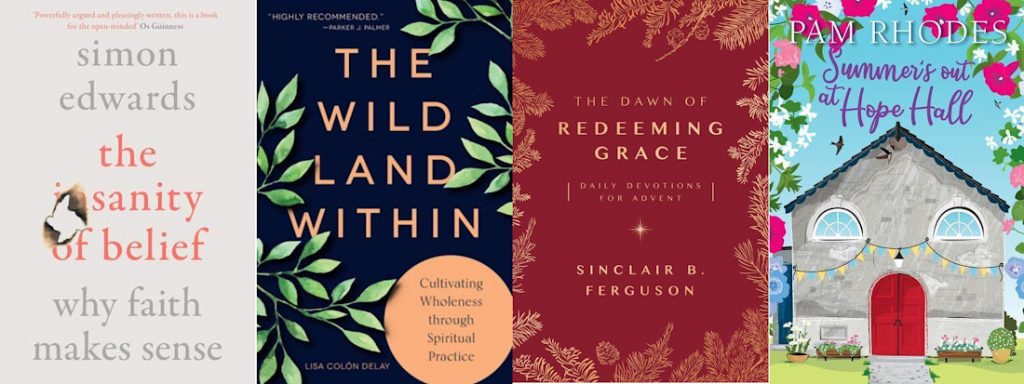
The Sanity of Belief by Simon Edwards
“In The Sanity of Belief Simon Edwards brings his sharp mind, quick wit, and legal training to bear on the question of whether there are strong enough reasons to find meaning and hope through Christian faith. Drawing on history, philosophy, literature and more, his rapid-fire ideas come wrapped in a generosity of spirit that leaves you feeling he’d still be your friend even if you disagreed with every word he said. This is a lively, fresh and thoughtful exploration of Christian belief. Highly recommended.”
The Wild Land Within by Lisa Colon Delay
“Lisa Colon Delay is a cartographer of the soul. Having ventured through its hills, forests and ravines, she knows where the hidden creatures lurk and how to cut a path through its darker regions. The result is The Wild Land Within, a spiritual map for reconnecting head and heart, thought and feeling, desire and action. Thoughtful, practical, and delightfully written, this is a deeply enriching book that can help us become whole.”
The Dawn of Redeeming Grace by Sinclair Ferguson
“Matthew’s account of Jesus’ early years can be cryptic, with its lengthy family tree and mysterious star gazing characters, yet no mention of Jesus’ later childhood. Walking Matthew’s narrative path with magnifying glass in hand, Sinclair Ferguson shows us why, pointing out easily-missed details and overlooked shifts in the plot. The Dawn of Redeeming Grace shows us what happens when God keeps His word to rescue lost humanity. Let’s follow the path to our own advent discoveries.”
Summer’s Out at Hope Hall by Pam Rhodes
“In this delightful tale of Kath Sutton and the motley bunch of characters revolving around the community hall she runs, Pam Rhodes has given us a story of warmth, humour and hope about lives shared and burdens carried. Summer’s Out at Hope Hall is one of those novels that helps you hear laughter in the darkness, reminding you that the sun really will rise tomorrow.”
Living in the Mourning Light by Andrea Corrie
“Andrea Corrie’s journey of grief has led her to ask big questions and traipse many paths in search of answers. Her search has already yielded some surprising discoveries. I for one will be watching where she leads next, and what I can learn from her thoughtful, caring soul.”
Memoir
How to Be Loved by Eva Hagberg Fisher
Battling drug addiction, workaholism, and then facing multiple serious health challenges, Fisher finds solace and healing through an unexpected network of friends. I found the writing beautiful though a little self-indulgent in places, and the long sentence bursts sometimes a bit forced. The first half of the book includes significant sexual references given Fisher’s search for salvation in others, which though not pictorially graphic, uses graphic language. Fisher had a lot of barriers to overcome. Without friends, she wouldn’t have surmounted them.
Theology and Christian Living
The Adventure of Living by Paul Tournier
While Swiss psychiatrist Paul Tournier’s books were often anecdotal and prone to dating, there is some real wisdom captured here. In essence he provides us with a theology of adventure, basing it in the nature of the God in whose image we’re made. I’ve riffed on some of his ideas here.
A Better Story by Glynn Harrison
Glynn Harrison traces the roots of the sexual revolution back to their source, then forward to their effects, then charts a counter-cultural response shaped by Christian convictions of sexuality. A helpful read that points out errors on all sides and refuses to cast stones, while attempting to map out a radical, faithful, winsome way forward.
Sources of the Christian Self by James Houston and Jens Zimmerman (eds)
Using philosopher Charles Taylor’s Sources of the Self as a springboard, this 700-page text explores the theme of Christian identity through history. It draws from Old and New Testament sources, and classical and contemporary theologians, writers and mystics, like Origen, Anselm, Dante, CS Lewis, Julian of Norwich, Dietrich Bonhoeffer, Flannery O’Conner and more. A gift from a thoughtful friend, it’s a work I’ll be turning to often.
Devotional
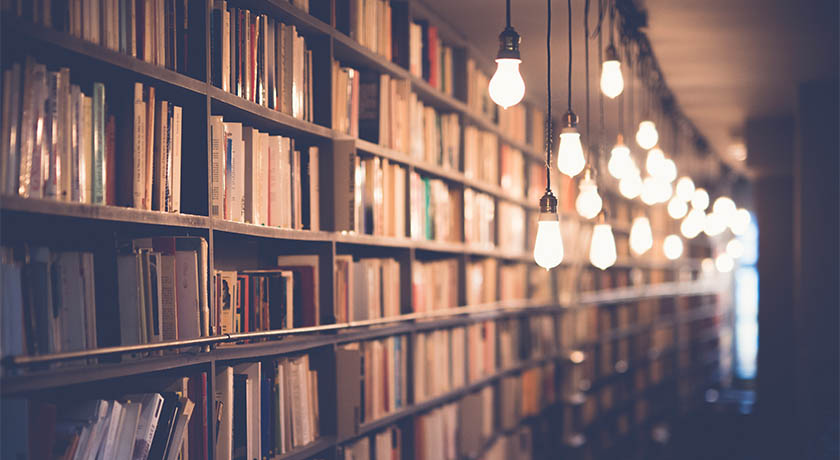
Standing on the Promises by Various
With a beautiful stitched leather and suede-style cover, this is a quality gift-edition devotional drawing from a variety of Our Daily Bread authors, myself included. Read by 60+ million people daily, I’m always amazed at how these short devotional articles change lives around the globe.
Bread and Wine by Various
With readings from a variety of authors – everyone from Augustine to John Stott, Oscar Wilde to Madeleine L’Engle – this is an intelligent and at times hard-hitting Lent devotional. Sometimes I found the readings oblique, but the challenge was mostly welcome. Lent is, after all, a time for self-examination and repentance, and these readings can lead to both.
General Non-Fiction
The Yellow House by Martin Gayford
For nine productive, turbulent and ultimately disastrous weeks, Vincent van Gogh and Paul Gaugin shared a house together. Gayford has scoured the correspondence of each artist with his family, friends and colleagues to reveal how van Gogh’s deteriorating mental health affected the relationship, but how both artists produced historic pieces through this time.
Klimt by Laura Payne
A short introduction to Gustav Klimt’s life and work through his key paintings, including his gold period which I particularly appreciate. Produced as part of a series for a supermarket chain, this little book avoids (most of) Klimt’s more erotically-charged work.
Friends by Robin Dunbar
Oxford University’s Robin Dunbar is a leading expert on the psychology of friendship. Having read many of his academic papers, I was glad to see this new book drawing his (and other’s) most important work together. The tone is informational rather than inspirational, with research projects and their discoveries recounted accessibly. A key text for anyone interested in the topic.
Friendship by Daniel J Hruschka
A masterful work of anthropology, Hruschka traces the concept of friendship through multiple cultures to find out if it’s a truly universal occurrence (it is), and how it differs across people groups (in many ways, markedly). A solid look at the rituals, practices and expectations of friendship across humanity as a whole.
The Friendship Formula by Caroline Millington
A light read written in a girlfriend-to-girlfriend style that seems to have the woman with toxic relationships in mind, this is a book for those who feel the need to review their friendships in order to feel better about themselves. I picked this up looking for a popular counterbalance to the heavy research-based friendship material I’ve been immersed in.
Phosphorescence by Julia Baird
With one of the most beautiful cover designs around, this book on ‘awe, wonder and the things that sustain us when the world goes dark’ has a stellar opening section on these themes that made me hungry for more. The book’s turn into feminist social critique, though not unexpected for anyone familiar with Baird’s work, felt a diversion to me, especially given the harder tone used to the more invitational opening chapters. But there’s lots to appreciate and learn from throughout.
On the Shelf
The Whole Christmas Story by Jo Swinney
You can count on Jo Swinney to take a fresh angle on whatever topic she tackles (her book Home is a favourite of mine). And so I’m looking forward to her new Christmas devotional, which starts the season not with the gospels’ birth narratives, but with Genesis and Psalms, giving us the ‘Google Earth view’ of Christmas, as she puts. The moving introductory chapter noting the recent tragic loss of Jo’s mother sets up how important Christmas really is for us all.
Finding the Peacemakers by Dan Morrice
I’m looking forward to reading Dan Morrice’s epic journey across countries, looking for the peacemakers in our world. From the Chilean miners famously released after sixty-nine days trapped underground, to Syrian refugees and revolutionaries in Israel-Palestine, he captures first-hand reports of history-changing, peace-promoting faith.
Becoming Wise by Krista Tippett
I’m halfway through the On Being presenter’s distillation of her years interviewing thinkers and poets on the big themes of being human.
Scent of Water by Penelope Swithinbank
Chaplain and retreat leader Penelope Swithinbank has written this unique devotional for the reader who has lost a loved one and needs short, daily encouragement to get through their grief. Drawing on her experience of tragically losing her mother, this designed hardcover book would make a great gift.
We Need to Talk About Race by Ben Lindsay
I also got part way through this important book on race and the church before my friendship-focused research got in the way. I’m looking forward to finishing it.
Discarded
Veronika Decides to Die by Paulo Coelho
Possibly the only book I’ve destroyed after reading, I submerged my copy in dishwater then tore each sodden page to shreds. Sucked in by the jacket description of a ‘suicidal woman who finds new meaning in life’, Coelho promotes seeking liberation through astral travel and pursuing any sexual deviancy one desires, all while giving a nod to religion and God. Rarely do I call a book demonically inspired but here I believe the description is apt.
FREE Personalised Bookplates!
How would you like to give a personalised gift to your family and friends this Christmas? Reflect with Sheridan is a hardcover gift book combining beautiful photography with 70 stories on joy, compassion, wonder and more. I would love to inscribe a copy just for them. Here’s how to do it.
What was the best book you read this year? Tell me in the comments


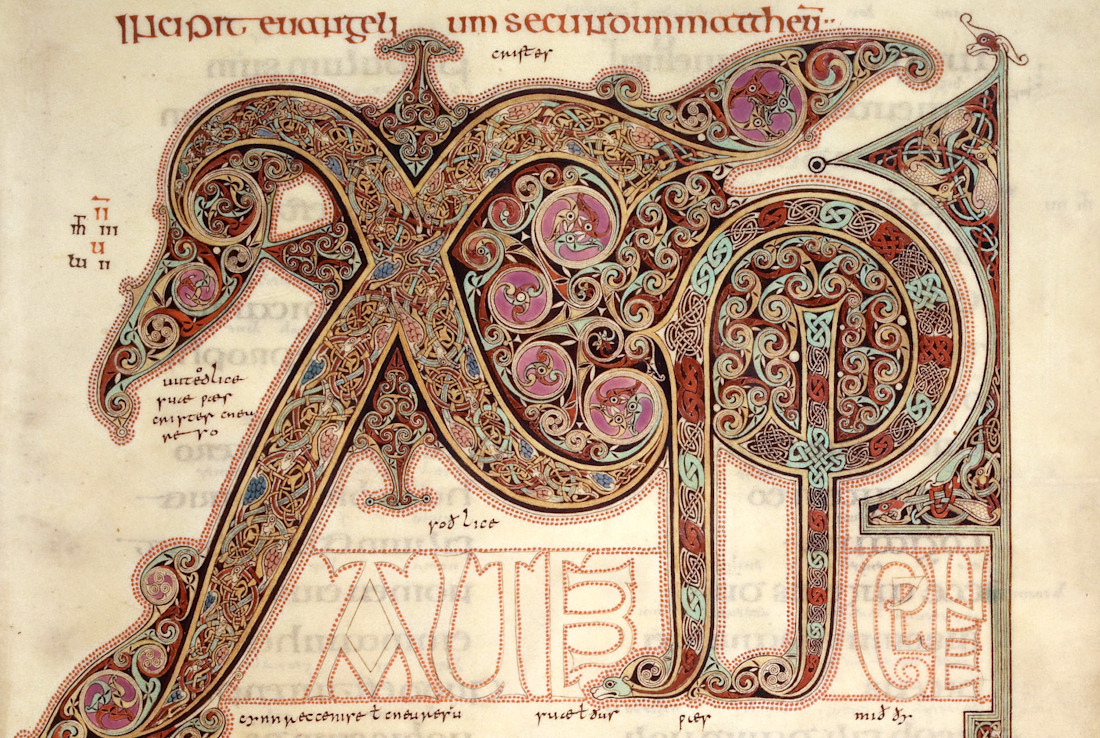
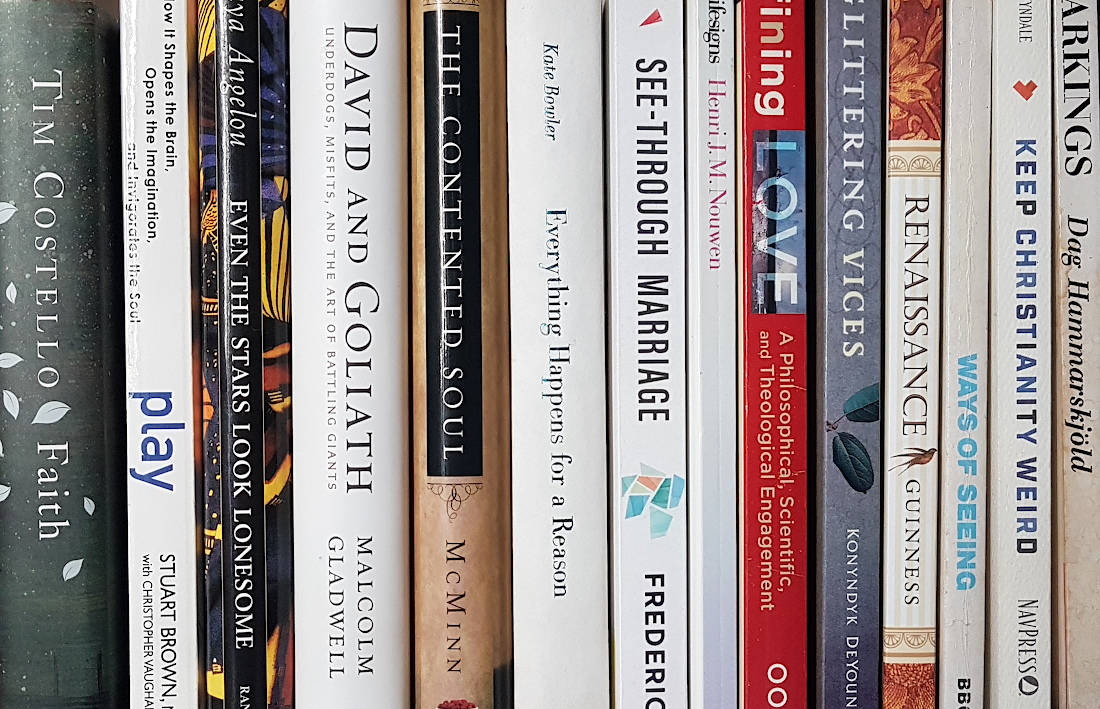
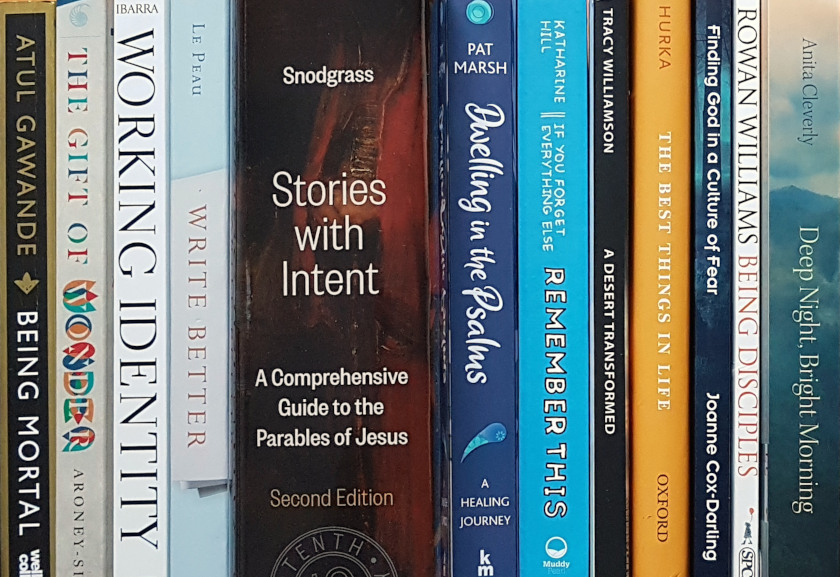
Annatjie Muehlberg
Sir
I love books and this article is very informative. I also enjoy your actions with the book you destroyed. One Christmas I was bored and could not find anything to read in the house. Our local cafe around the corner have a shelf (full of dust) in the back with books. I went there foudn 2 books. The one I destroyed gleefully, the other I still have today and sometimes still read it. It is non-fictional. This happened 30 years ago.
Sheridan Voysey
Oh do tell which books they were!
Annatjie Muehlberg
Sorry my reply is late. The one book (the destroyed one) was about a canniball/necrophiliac -disgusting.
The other was a collection of authors with short biographies and pictures (a treasure),
Glenda Troy
A favourite book by Anita Heiss called
‘Bila Yarrudhanggalangdhuray’.
Another book edited by Anita Heiss contributed to by multiple narrators called
‘Growing Up Aboriginal in Australia’.
Other books to relax whilst reading are generally a number of Alexander McCall Smith novels especially ‘The No.1 Ladies’ Detective Agency’. I find this can be helpful reading when life gets too serious.
It’s difficult to pick only one favourite.
Last one for now is rediscovering the book of Ruth from the Bible. So much more to understand than I’ve realised before, giving much encouragement and hope.
Sheridan Voysey
My wife unwinds to Alexander McCall Smith novels too, and I’m noting those books on Aboriginal life. Thank you.
Marcia
My favourite book of this year is “whispers of rest” by Bonnie Gray. A lovely daily workbook of 40 days that helped me reconnect with my faith and God and most importantly for me right now to remember rest is ok and we all need time to rest to reflect and rebuild our resilience to whatever life throws at us. It has a daily bible reading, a call to prayer, and an activity – all taking as much or as little time as we have to spare. I was recommended this by a very good Christian friend and would recommend to others without hesitation.
Sheridan Voysey
Excellent. Will check that one out.
Stephen Whitwell
Hi,
Just finished reading “Everything Is Figureoutable”, by Marie Forleo. Brilliant. Practical. Helpful. Quotable. She deals with fear, beliefs, dreams, perfectionism, our special gift to the world. Tons on applicable ideas and principles that just ring true.
I have marked and remarked, highlighted, and drawn all over my copy. That’s when I know its a great book.
Well worth the read.
Blessings,
Stephen Whitwell
Sheridan Voysey
I judge books by how much I mark them up too. Thanks for the book tip.
Douglas McCarthy
“Crossing to Safety” is one of the most evocative and memorable books I’ve read in my lifetime. One to savor.
Sheridan Voysey
A delightful novel. You’d like A Gentleman in Moscow too, I’d imagine.
Tanya Marlow
I’m so gratified you hated Paulo Coehlo. I have read that one, which I actually thought was better than his really famous one, The Alchemist, which is sentimentalist drivel. Hated both with a passion.
It was also interesting to see Eva Hagberg Fisher on your list, as she’s a writer I follow in the chronic illness world because of her story of how destructive misdiagnosis can be. For other readers, she’s not a Christian, so it’s not religious book. I read one of her published essays about architecture and her marriage ending, and it was wonderful, memorable writing.
I’ve also enjoyed Amy Boucher Pye’s book on prayer (and agree that it left me motivated to actually get praying), Penelope Swithinbank’s book on grief and Jo Swinney’s Advent book.
I would additionally recommend Where the Crawdads Sing as my favourite novel of the year (integrates beautiful nature and zoology writing with a compelling murder mystery, We Are The Winter People for poetry by Jenny Rowbory (striking poetry about wrestling with faith and non-healing), and Black Lives Matter books by Austin Channing Brown, Ben Lindsay, Azariah France-Williams and Chine MacDonald.
Sheridan Voysey
Excellent additions, Tanya. You reminded me that I’m also part way through Ben Lindsay’s We Need to Talk About Race but got sidetracked by my friendship reading. Will add it above.
I didn’t know about Hagsberg-Fisher’s divorce, which puts the book’s ending in a slightly different light (as does the article I read of hers which shows destructive patterns in the book resurfacing while she throws her ex-husband under the bus for them. Argh. I can understand the chronic illness/misdiagnosis angle though – what a battle she had). I must check out Jenny Rowbory’s book.
Franci
Hello from Slovenia, I am so grateful that I found your book, after so many others books. My favorite book is “See yourself through God’s eyes”, by Marie Paul Curley. I am also a writer and I published nine fairy tale’s and my true story “A key to the homeless”. I am proud that I published as a self publisher for blind children (Brail text and cd player, and dvd in sign language. May God be your guide in every moment of your life, kind regrads Franci Rogac
Sheridan Voysey
Thanks Franci. All the best in your publishing!